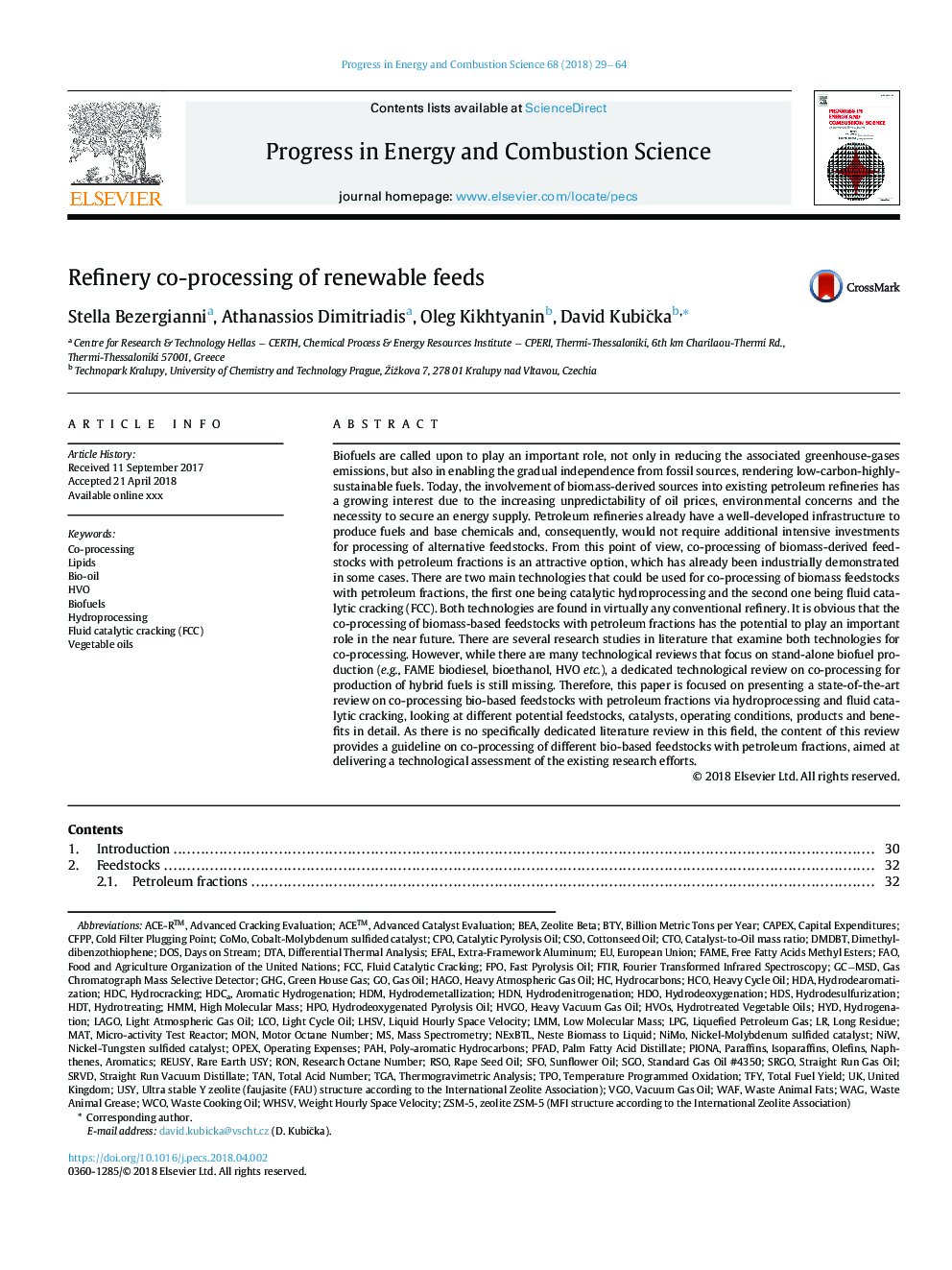| Article ID | Journal | Published Year | Pages | File Type |
|---|---|---|---|---|
| 6679495 | Progress in Energy and Combustion Science | 2018 | 36 Pages |
Abstract
Biofuels are called upon to play an important role, not only in reducing the associated greenhouse-gases emissions, but also in enabling the gradual independence from fossil sources, rendering low-carbon-highly-sustainable fuels. Today, the involvement of biomass-derived sources into existing petroleum refineries has a growing interest due to the increasing unpredictability of oil prices, environmental concerns and the necessity to secure an energy supply. Petroleum refineries already have a well-developed infrastructure to produce fuels and base chemicals and, consequently, would not require additional intensive investments for processing of alternative feedstocks. From this point of view, co-processing of biomass-derived feedstocks with petroleum fractions is an attractive option, which has already been industrially demonstrated in some cases. There are two main technologies that could be used for co-processing of biomass feedstocks with petroleum fractions, the first one being catalytic hydroprocessing and the second one being fluid catalytic cracking (FCC). Both technologies are found in virtually any conventional refinery. It is obvious that the co-processing of biomass-based feedstocks with petroleum fractions has the potential to play an important role in the near future. There are several research studies in literature that examine both technologies for co-processing. However, while there are many technological reviews that focus on stand-alone biofuel production (e.g., FAME biodiesel, bioethanol, HVO etc.), a dedicated technological review on co-processing for production of hybrid fuels is still missing. Therefore, this paper is focused on presenting a state-of-the-art review on co-processing bio-based feedstocks with petroleum fractions via hydroprocessing and fluid catalytic cracking, looking at different potential feedstocks, catalysts, operating conditions, products and benefits in detail. As there is no specifically dedicated literature review in this field, the content of this review provides a guideline on co-processing of different bio-based feedstocks with petroleum fractions, aimed at delivering a technological assessment of the existing research efforts.
Keywords
LPGWCOPAHFCCCFPPTGAHydrodenitrogenationLCOZSM-5GHGWAGUSYHVOHDSCAPEXCPODTAHDOCSOTANSFOHDAWAFLMMHDCHDCAHDMTPOHDNCTOHMMHCOBEALHSVCoMoPFADSGOPoly-aromatic hydrocarbonsHDTOPEXVGORSOEFALSRGOWHSVFPOHpoHydrodearomatizationExtra-framework aluminumDifferential Thermal AnalysisEuropean UnionResearch Octane NumberZeolite betaThermogravimetric analysisFluid catalytic crackingPalm fatty acid distillatehigh molecular masslow molecular massDOSNiMoTemperature programmed oxidationSunflower oilBio-oilVegetable oilsWaste cooking oilCottonseed oilFast pyrolysis oilRONFood and Agriculture Organization of the United NationsWeight hourly space velocityliquid hourly space velocityBiofuelsTotal Acid Numbermotor octane numberHydrocrackingFTIRMass spectrometryFAOFourier transformed infrared spectroscopyMatFAME یا fatty acid methyl esters MONlight cycle oilGas oilVacuum gas oilStraight run gas oilCold filter plugging pointNiWOperating Expensescapital expendituresCo-processingHydrotreatingHydrodesulfurizationHydrodemetallizationHydAromatic hydrogenationHydrodeoxygenationHydrogenationHydrocarbonsUnited KingdomHydroprocessingLipidsFluid Catalytic Cracking (FCC)liquefied petroleum gasGreen house gas
Related Topics
Physical Sciences and Engineering
Chemical Engineering
Chemical Engineering (General)
Authors
Stella Bezergianni, Athanassios Dimitriadis, Oleg Kikhtyanin, David KubiÄka,
